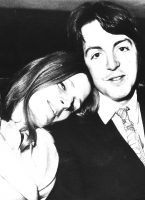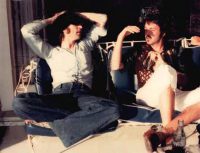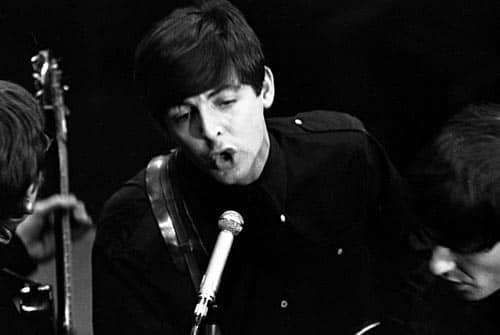Let It Be
When I find myself in times of trouble
Mother Mary comes to me
Speaking words of wisdom, let it be
And in my hour of darkness
She is standing right in front of me
Speaking words of wisdom, let it be
Oh, let it be, let it be, let it be, let it be
Whisper words of wisdom, let it be
And when the broken hearted people
Living in the world agree
There will be an answer, let it be
For though they may be parted
There is still a chance that they will see
There will be an answer, let it be
Oh, let it be, let it be, let it be, let it be
And there will be an answer, let it be
Oh, let it be, let it be, let it be, let it be
Whisper words of wisdom, let it be
Oh, let it be, let it be, let it be, let it be
Whisper words of wisdom, let it be
And when the night is cloudy
There…
Paul McCartney was a singer and multi-instrumentalist in The Beatles. Alongside John Lennon, he was half of one of the world's most successful songwriting teams in history.
John Lennon, 1980
All We Are Saying, David Sheff
All We Are Saying, David Sheff
The early years
James Paul McCartney was born in Liverpool's Walton Hospital on 18 June 1942. His father Jim worked in the cotton trade and played trumpet and piano in jazz and ragtime bands, and his mother Mary worked as a midwife.
Paul attended the Stockton Wood Road primary school, then went on to the Joseph Williams junior school before passing his 11 Plus in 1953 and gaining a place at the Liverpool Institute.
The following year, while travelling on a bus to the Institute, he met George Harrison, who was also a student there.
In 1955 the McCartneys moved to 20 Forthlin Road, a council house in the Allerton district of Liverpool. It cost them one pound and six shillings a week to live there. The house was bought by the National Trust in 1995, and today is a popular tourist destination. Back then, though, it was an unassuming terraced house built by the local authority in the 1920s.
On 31 October 1956, Mary McCartney died of an embolism following a mastectomy. She was a heavy smoker who had been suffering from breast cancer. The death shook the McCartney family, and later led to a bond between Paul and John Lennon, who lost his mother in 1958.
Jim McCartney was a keen musician who had been leader of Jim Mac's Jazz Band in the 1920s. There was an upright piano in the front room at 20 Forthlin Road, which Jim bought from Harry Epstein's NEMS store, which Beatles manager Brian Epstein would later take over.
Jim encouraged Paul and his brother Mike to be musical, and gave Paul a trumpet following the death of his mother. When skiffle became a national craze, however, Paul swapped the instrument for a £15 Framus Zenith acoustic guitar.
Being left-handed, Paul initially had trouble playing the instrument. He later learned to restring it, and wrote his first song, I Lost My Little Girl. He took music lessons for a while, but preferred instead to learn by ear. Paul also began playing piano, and wrote When I'm Sixty-Four while still living at Forthlin Road.
Paul McCartney met John Lennon at the Woolton fete on 6 July 1957, between performances by The Quarrymen. They became friends and began writing and performing songs together. McCartney later persuaded Lennon to allow George Harrison into the band as lead guitarist in 1958.
With The Beatles
The Beatles, as they became, gradually grew in popularity after performing many times in and around Liverpool and Hamburg, Germany. After Stuart Sutcliffe left the band, McCartney reluctantly took over his role as bass guitarist. He later bought a left-handed 1962 Hofner bass, which became part of The Beatles' iconography during the 1960s.
After The Beatles signed to Parlophone in 1962 and began releasing records, the songwriting partnership of Lennon-McCartney became celebrated. As well as penning the bulk of the band's recorded output, they also wrote for artists including Cilla Black, Billy J Kramer and Peter and Gordon.
As they became a worldwide phenomenon The Beatles relocated from Liverpool to London, but Lennon, Harrison and Ringo Starr eventually moved away from the city. McCartney, however, remained in central London, enjoying the various artistic and cultural benefits of the capital. He lived for some years at 7 Cavendish Avenue in St John's Wood, near to EMI's Abbey Road Studios.
In the mid 1960s McCartney became interested in experimental music, and made tape loops and avant-garde recordings, both with The Beatles and alone. The first to take on a non-Beatles musical commitment, in 1966 McCartney wrote the score for the film The Family Way. It later won an Ivor Novello award for Best Instrumental Theme.
By this time The Beatles had long since tired of touring, having become unable to hear their own voices and instruments above the screams of the audience. McCartney reluctantly agreed to the other members' wishes to stop touring, which they did in August 1966.
When Brian Epstein died in 1967, McCartney made efforts to keep the group together. He effectively led the making of the Magical Mystery Tour film and album, and in 1969 tried to persuade the group to take to the stage once more. Lennon's response was: "I think you're mad."
However, they did play the celebrated rooftop gig on the top of Apple's offices, filmed as part of the Let It Be project. McCartney led the group through their final recorded album, Abbey Road, released prior to Let It Be in 1969.
 He was unhappy with Phil Spector's production on the Let It Be album. He also favoured Lee Eastman, father of Paul's wife Linda, when the group were looking for a new manager in 1969. Instead they appointed Allen Klein, a move bitterly contested by McCartney.
He was unhappy with Phil Spector's production on the Let It Be album. He also favoured Lee Eastman, father of Paul's wife Linda, when the group were looking for a new manager in 1969. Instead they appointed Allen Klein, a move bitterly contested by McCartney.
Although John Lennon left The Beatles in September 1969, McCartney persuaded him to keep it from the press. Instead, McCartney himself announced the band's break-up on 10 April 1970, during promotion for his first solo album McCartney. The Beatles' legal partnership was dissolved following a lawsuit filed by McCartney in December 1970.
The solo years
As with all the former members of The Beatles, McCartney's solo output was varied, yet also variable in quality - for every Band On The Run it seemed like there was a Frog Chorus. In August 1971 he formed Wings, and in 1977 released Mull Of Kintyre, which remained the UK's highest selling single until 1984. In the 1980s he collaborated with Elvis Costello, and in 1991 released his first classical work, the Liverpool Oratorio. Since then he has released a wide range of albums in a variety of styles, and has undertaken a number of world tours.
 John Lennon's death in December 1980 led to a media frenzy. Asked how he felt, McCartney was reported as describing it as "a drag". He was pilloried for the comments, and later expressed regret, saying he had been at a loss for words. He later revealed that he had cried all evening in reaction to the news.
John Lennon's death in December 1980 led to a media frenzy. Asked how he felt, McCartney was reported as describing it as "a drag". He was pilloried for the comments, and later expressed regret, saying he had been at a loss for words. He later revealed that he had cried all evening in reaction to the news.
McCartney retired from live performances for a time following the death of John Lennon in 1980, although in subsequent years he returned to the stage for a series of world tours. Wings disbanded in 1981, the same year that he, Ringo Starr and George Harrison sang together on the latter's All Those Years Ago, a tribute to Lennon.
From 1976 McCartney began playing Beatles songs again, after years of refusing to. In the 1990s he reunited with Harrison and Starr to work on the Anthology project, and added instrumentation and vocals to two Lennon demos, Free As A Bird and Real Love.
Today Paul McCartney holds the record of being the most successful musician and composer in pop music history.

No comments:
Post a Comment